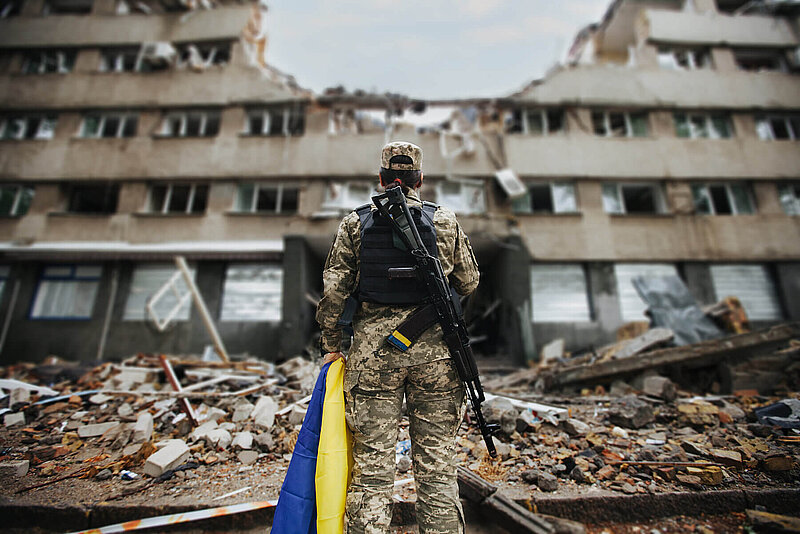
Senior Researcher at the Centre for International Security Tobias Bunde answers three questions on the second anniversary of Russia’s invasion of Ukraine.
Two years ago, Russia launched a full-scale invasion of Ukraine, threatening Ukraine’s existence as a country and inaugurating a new geopolitical era in Europe. With no end in sight, the war was one of the major topics at the 2024 Munich Security Conference (MSC), which took place last week. In an interview, Senior Researcher at the Centre for International Security Dr Tobias Bunde, who also serves as Director of Research and Policy at the MSC, talks about the prospects of Ukrainian victory, Western support for the Ukrainian war effort, and how the war is related to global cooperation.
The war in Ukraine is now entering its third year. What are the prospects for Ukraine winning the war?
Right now, the Ukrainian armed forces are under enormous pressure, and the outlook for the coming months is dire. But that does not mean that Ukraine cannot win this war. To a large degree, this question will depend on the political, financial and military support it receives. While Russia has mobilised its resources and significantly ramped up its military industry since the beginning of the invasion, Western countries have failed to make the necessary investments. When Ukraine was able to withstand and then push back Russian forces during the first year of the war, many Western politicians seemed to have concluded that the war could be won without a major investment in our own defence industry. As a result, today Ukraine does not have the weapons and ammunition it needs to prevail. I think Ukrainian President Volodymyr Zelenskyy found the right words for the situation in Munich: “Please don’t ask Ukraine when the war will end. Ask yourself why Putin is still able to continue it.”
What role did the war play at the MSC? Was there dwindling support for Ukraine at the conference?
As in previous years, the war was at the heart of the conference – although it was clearly not the only important topic on the agenda. The mood this year was less upbeat than last year when more people were optimistic about the course of the war. Many worried about the long-term support for Ukraine from the United States, and several leaders at the conference voiced their frustration with the lack of ambition and sense of urgency among Europeans. But I think the debates have driven home the point that, while the other European countries are not parties to the war itself, Ukraine’s war against the Russian aggressor is also their war. More people seem to understand that it would have severe consequences for Europe as a whole if Putin were to prevail. Peace would not follow for Europe if Ukraine had to give up large parts of its territory.
The coming months will be crucial: support for Ukraine might indeed dwindle if the people think that Ukraine does not stand a chance. But, again, this is something that policymakers in Europe can influence. Time, however, is of the essence.
In the Munich Security Report 2024, you warn that countries are losing sight of the benefits of global cooperation. To what extent is this related to the war in Ukraine, and do you see any solutions?
While we make a broader point about states focussing on the relative gains of global cooperation in our report, one could argue that Russia’s war on Ukraine is both a symptom and a catalyst of what one could call a general “geopolitical recession”, marked by a lack of trust and rising tensions among key actors. Russia has probably never bought into the European logic of positive-sum cooperation but has always looked at European security in zero-sum terms – most Europeans just did not understand this.
Today, we have to grudgingly accept that security in Europe cannot be secured in cooperation with Russia, but instead needs to be organised against Russia. Moreover, the war has also underlined the risks of dependencies on autocracies and has furthered the debate about “de-risking” and “friendshoring”. Western policymakers are now more aware of the risks of cooperation with autocracies – most notably China – and see the need to strengthen cooperation with like-minded states. While this is a necessary course correction, it also comes with the risk of a vicious cycle in which ever more policy fields and an increasing number of countries are engulfed in zero-sum thinking.
One thing is clear: Ukraine losing the war would make things worse. Or to frame it positively: if Ukraine won the war, this would send a clear message that aggression does not pay off. In that sense, we have to agree with Vladimir Putin, who pointed out last year that this is “not a territorial conflict […]. The issue is […] the principles underlying the new international order.” Those who want to live in a rules-based order, one which provides the basis for cooperative relations to the benefit of everyone, have a vital interest in helping Ukraine win this war.
The Hertie School is not responsible for any content linked or referred to from these pages. Views expressed by the author/interviewee may not necessarily reflect the views and values of the Hertie School.
More about our expert
-
Tobias Bunde, Senior Researcher, Centre for International Security
